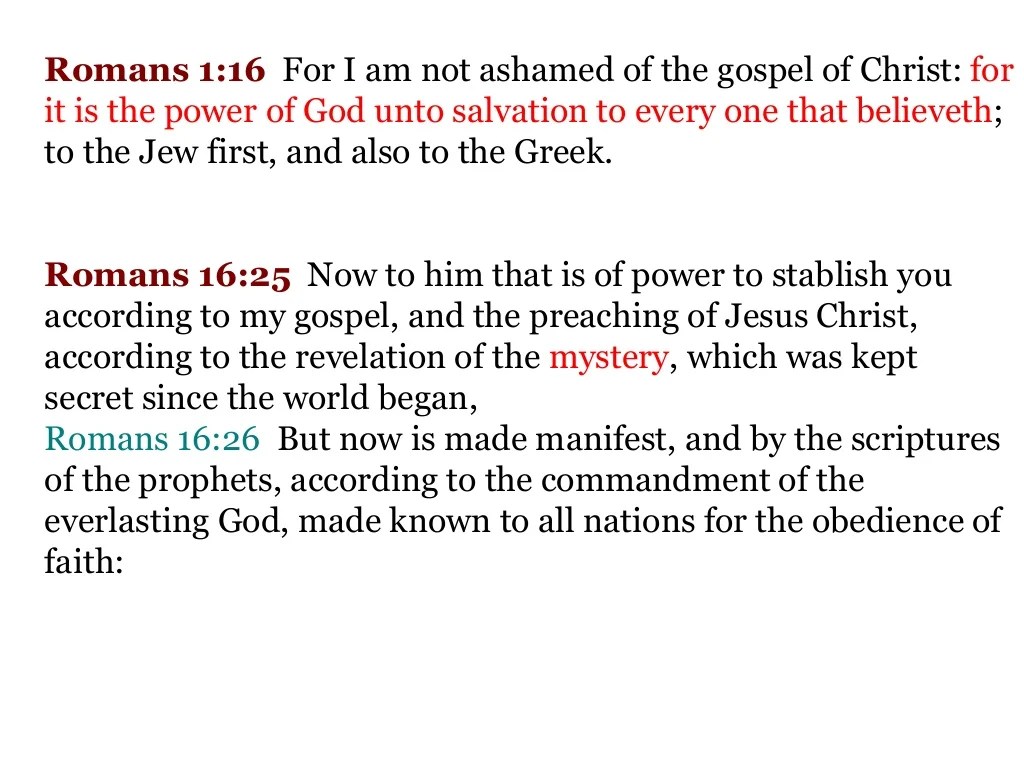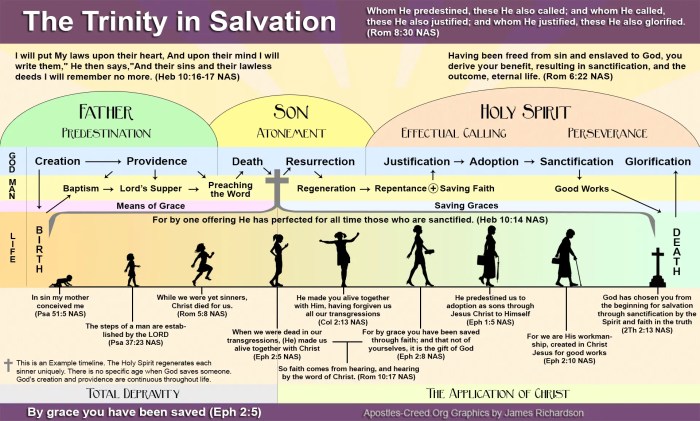El plan de salvacion segun la biblia – The Salvation Plan According to the Bible sets the stage for this enthralling narrative, offering readers a glimpse into a story that is rich in detail and brimming with originality from the outset. This comprehensive guide delves into the intricacies of God’s plan for redemption, providing a thorough examination of its foundation, process, results, implications, and ultimate goal.
The content of the second paragraph that provides descriptive and clear information about the topic
The Foundation of the Salvation Plan

The foundation of the salvation plan is laid upon the understanding of sin and its consequences. Sin is the willful transgression of God’s law, and it separates us from Him. The consequences of sin are both physical and spiritual, including death, disease, and eternal separation from God.
The Role of God’s Grace in Salvation
God’s grace is the unmerited favor that He extends to us, despite our sin. It is through His grace that we are able to be saved. God’s grace is not based on our works or our righteousness, but on His love for us.
The Significance of Jesus Christ’s Sacrifice
Jesus Christ’s sacrifice on the cross was the ultimate expression of God’s love for us. Jesus died in our place, taking the punishment for our sins. His death and resurrection made it possible for us to be forgiven of our sins and reconciled to God.
The Process of Salvation

Salvation is a process that involves a series of steps. These steps include repentance, faith, and baptism. Repentance is the act of turning away from sin and towards God. Faith is the belief that Jesus Christ is the Son of God and that He died on the cross to pay for our sins.
Baptism is the outward expression of our faith in Jesus Christ.The Holy Spirit plays a vital role in the salvation experience. The Holy Spirit convicts us of our sin and leads us to repentance. The Holy Spirit also helps us to understand the gospel and to believe in Jesus Christ.
The Holy Spirit indwells us when we are saved and empowers us to live a life that is pleasing to God.There are many examples of individuals in the Bible who experienced salvation. One example is the apostle Paul. Paul was a persecutor of the church before he was saved.
However, after he encountered Jesus Christ on the road to Damascus, he repented of his sins and believed in Jesus Christ. Paul went on to become one of the greatest missionaries in the history of the church.Another example of an individual who experienced salvation is the thief on the cross.
The thief was crucified next to Jesus Christ. However, before he died, he repented of his sins and believed in Jesus Christ. Jesus Christ promised the thief that he would be with Him in paradise.Salvation is a free gift from God.
We cannot earn salvation by our own good works. Salvation is available to all who repent of their sins and believe in Jesus Christ.
The Results of Salvation
Salvation, according to Christian theology, brings about significant and transformative benefits in the lives of those who receive it. These benefits include forgiveness of sins, the gift of eternal life, and the establishment of a personal relationship with God.
The forgiveness of sins is a central aspect of salvation. Through the sacrificial death and resurrection of Jesus Christ, believers are cleansed from their past sins and reconciled to God. This forgiveness brings freedom from guilt, shame, and condemnation, allowing individuals to experience peace and joy in their hearts.
Eternal Life
Another significant benefit of salvation is the promise of eternal life. Salvation guarantees believers a place in heaven, where they will spend eternity in the presence of God. This hope provides comfort and assurance, knowing that they have a secure future beyond the limitations of earthly life.
Relationship with God
Salvation also establishes a personal relationship with God. Through the indwelling of the Holy Spirit, believers become children of God and are given the privilege of communicating with Him through prayer and Bible study. This relationship transforms their lives, bringing purpose, meaning, and guidance.
Examples of Transformation
The transformative power of salvation can be seen in the lives of countless individuals who have experienced its benefits. Many have been delivered from addictions, broken relationships, and feelings of hopelessness. Salvation has brought them a new sense of purpose, joy, and peace.
Assurance of Salvation
For those who have received salvation, the assurance of their eternal security is a source of great comfort and confidence. This assurance is based on the promises of God and the work of Christ on their behalf. It enables believers to live with boldness and freedom, knowing that their salvation is secure.
The assurance of salvation has practical implications for daily living. It motivates believers to live lives that are pleasing to God, to share their faith with others, and to serve as ambassadors of Christ in the world.
The Implications of the Salvation Plan

The salvation plan, as Artikeld in the Bible, has profound implications for our social and ethical lives. Salvation is not merely an individualistic pursuit but has significant consequences for our relationships with others and our responsibilities as Christians.
The Social Implications of Salvation
Salvation brings about a fundamental shift in our social interactions. As we become followers of Christ, we are called to love and serve others, regardless of their background or circumstances. This love extends to both believers and non-believers, challenging us to break down barriers of prejudice and discrimination.
Salvation also fosters a sense of community and belonging among believers. The church becomes a family where we can support and encourage one another, sharing in the joys and sorrows of life. Through fellowship and worship, we are strengthened in our faith and equipped to live out our Christian calling.
The Ethical Implications of Salvation
Salvation not only transforms our social relationships but also shapes our ethical behavior. As we are forgiven and reconciled to God, we are empowered to live lives of integrity and righteousness. The Holy Spirit guides us to make choices that are pleasing to God and beneficial to others.
Salvation calls us to pursue justice, compassion, and humility. We are to stand up for the oppressed, care for the marginalized, and forgive those who wrong us. Our ethical behavior should reflect the character of Christ, who exemplified love, grace, and self-sacrifice.
The Importance of Sharing the Message of Salvation
The salvation plan is not meant to be kept secret. As Christians, we are commissioned to share the message of salvation with others, both through our words and our actions. This is not a burden but a privilege, as we have the opportunity to introduce others to the transformative power of God’s love.
By sharing the gospel, we not only fulfill the Great Commission but also participate in God’s redemptive work. We become instruments of God’s grace, offering hope and forgiveness to a world in need of salvation.
Objections and Misconceptions about Salvation: El Plan De Salvacion Segun La Biblia

Despite the clarity of the biblical teachings on salvation, various objections and misconceptions often arise. These objections may stem from misunderstandings, misinterpretations, or personal biases. It is crucial to address these objections and misconceptions with clarity and sound biblical reasoning to ensure a comprehensive understanding of the salvation plan.
Objection: Salvation is Unfair
Some individuals argue that salvation is unfair because it excludes those who have not heard the gospel or have not had the opportunity to accept Christ. However, the Bible teaches that God is just and desires all people to be saved (1 Timothy 2:4). Salvation is not based on merit or works but on the grace of God (Ephesians 2:8-9).
God’s love extends to all, and He provides opportunities for all to hear the gospel and respond to His call.
Misconception: Once Saved, Always Saved, El plan de salvacion segun la biblia
The misconception that “once saved, always saved” suggests that salvation is irrevocable and cannot be lost. While it is true that God’s grace is sufficient to keep believers secure in their salvation (John 10:28-29), the Bible also warns against complacency and the possibility of falling away from faith (Hebrews 6:4-6).
Salvation is not a one-time event but an ongoing process of growth and sanctification. Believers must remain faithful and continue to walk in obedience to God’s will.
Objection: Salvation is Only for the Elect
Some argue that salvation is predestined only for a select group of people (the elect). However, the Bible teaches that God’s love and grace are extended to all (John 3:16). Predestination refers to God’s foreknowledge of those who will believe and be saved (Romans 8:29-30), not to an arbitrary choice of individuals for salvation.
Salvation is available to all who repent and believe in Christ (Acts 2:38-39).
Misconception: Salvation is a License to Sin
The misconception that salvation is a license to sin arises from a misunderstanding of God’s grace. While salvation frees believers from the condemnation of sin (Romans 8:1), it does not condone or encourage sin. True salvation leads to a transformation of heart and a desire to live in obedience to God’s will (2 Corinthians 5:17). Believers are called to strive for holiness and to resist temptation (Ephesians 4:22-24).
The Ultimate Goal of the Salvation Plan

The ultimate goal of the salvation plan is the restoration of all things in Christ, encompassing the renewal of the entire cosmos and the establishment of a new heaven and a new earth. This restoration involves the redemption of humanity from sin and the reconciliation of all creation to God.
The salvation plan culminates in the manifestation of God’s kingdom, where righteousness, peace, and joy prevail.
The New Heaven and the New Earth
The biblical concept of the new heaven and the new earth signifies the transformation and renewal of the current cosmos. It represents a realm where God’s presence dwells fully, and where the effects of sin and corruption are eradicated. The new heaven and the new earth symbolize the ultimate consummation of God’s plan for creation, where all things are made new and perfect.
Hope and Joy for the Future
The salvation plan offers hope and joy for the future, amidst the challenges and uncertainties of life. It provides assurance that God is actively working to restore all things and bring about a glorious future for those who trust in him.
The promise of the new heaven and the new earth serves as a beacon of hope, reminding believers that the best is yet to come and that their present struggles are temporary.
Common Queries
What is the foundation of the salvation plan?
The foundation of the salvation plan lies in the nature of sin and its consequences, the role of God’s grace, and the significance of Jesus Christ’s sacrifice.
What are the steps involved in receiving salvation?
The process of salvation involves repentance, faith, and baptism, facilitated by the Holy Spirit.
What are the benefits of salvation?
Salvation offers forgiveness of sins, eternal life, and a relationship with God, transforming lives and bringing about positive changes.